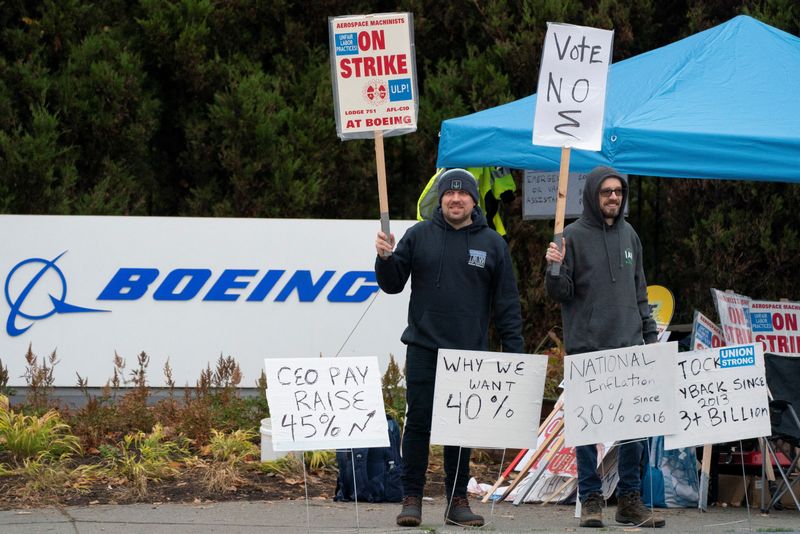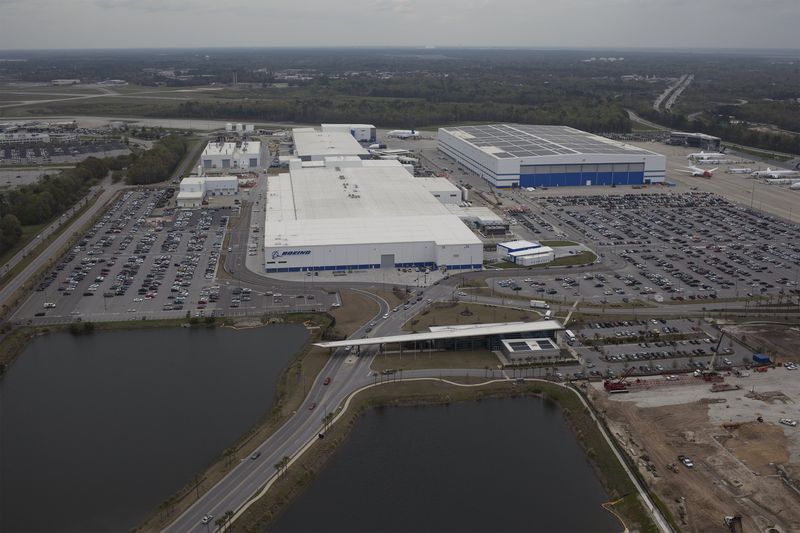By Daniel Catchpole, Allison Lampert and Matt McKnight
SEATTLE (Reuters) – Boeing factory workers voted on Wednesday to reject a contract offer and continue a strike lasting more than five weeks, in a blow to new CEO Kelly Ortberg’s plan to boost the struggling finances support aircraft manufacturer.
64% of votes were against the agreement, which provided for a 35% wage increase over four years. This was a major setback for Ortberg, who took the top position in August with a promise to work more closely with factory workers than his predecessors.
The rejection of Boeing’s (NYSE:) bid, which comes after 95% of employees voted against an initial contract last month, reflects and deepens years of resentment from employees who felt cheated by the company in talks a decade ago. a financial crisis.
After the vote, union leaders said they were prepared to immediately resume negotiations with Boeing in the first major negotiations since 2014, when the company used the threat to move production of the new version of the 777 out of the region to a to push through a deal that put an end to traditional pensions.
The union is seeking a 40% wage increase and the return of the promised pension.
Boeing factory workers also vented frustration after a decade in which their wages lagged behind inflation and critics complained that the plane maker had spent tens of billions of dollars on share buybacks and paying record bonuses for executives.
“This membership has been through a lot… there are some deep wounds,” Jon Holden, the union’s chief contract negotiator, told reporters after the vote.
“I want to get back to the table. Boeing needs to come to the table too. Hopefully we can have fruitful discussions with the company and Mr. Ortberg to try to resolve this.”
Boeing declined to comment on the vote.
About 33,000 operators downed tools at Boeing’s West Coast factories on September 13, halting production of the top-selling 737 MAX and the 767 and 777 wide-body programs.
Time is running out for Boeing, historically the largest U.S. exporter, and the largest labor union to reach an agreement before the busy political period surrounding the Nov. 5 presidential election.
When Boeing and IAM were at a standoff earlier this month, acting U.S. Secretary of Labor Julie Su had helped put the final bid up for a vote after attending in-person talks with both sides in Seattle last week.
Holden said after the union vote that he would contact the White House to see if the union could get more help in negotiations with Boeing.
“After the initial contract offer was rejected, the honeymoon was over after the labor reset. This further confirms that,” said Scott Hamilton, an aviation consultant.
“It’s bad news for everyone: Boeing, employees, suppliers, customers and even the national economy.”
Boeing is the largest customer for a U.S. aerospace supply chain already facing critical financial pressures.
Fuselage supplier Spirit AeroSystems (NYSE:) warned that if the strike continued beyond the end of November, layoffs and more drastic furloughs would follow.
The company, which is about to be taken over by Boeing, has already announced a 21-day furlough for 700 employees.
‘CERTAIN MOMENT’
Boeing has announced plans to cut 17,000 jobs and is nearing a plan to raise up to $15 billion from investors to help preserve the company’s credit rating, while some airlines have had to cut their schedules due to aircraft delivery delays.
Ortberg warned on Wednesday that there is no quick solution for the ailing aircraft manufacturer.
In a quarterly earnings report, Boeing predicted it would burn cash through 2025. Jefferies analyst Sheila Kahyaoglu said after the vote that the decision to extend the strike could worsen the expected cash flow.
The specter of a quality crisis caused by an airborne panel blowout in January hangs over Boeing.
Richard Aboulafia, managing director of AeroDynamic Advisory, said this was now the “defining moment” of Ortberg’s short tenure and he needed to get a deal done quickly.
“There’s a sense that he hasn’t handled this as well as he could have,” Aboulafia said. “They have to get this done, and they are in a weak position.”
The workers’ rejection on Wednesday was the second in a formal vote after the offer of a 25% pay rise over four years was rejected last month, sparking the strike.
Many comments on social media and from workers outside polling stations had cast doubt on a deal.
“We are ready to go on strike again until we get a better deal,” 25-year-old Irina Briones said after the vote.
“They took some numbers and moved them around to make it look like they were giving us more money than they actually were,” said Josh Hajek, 42, who worked on wing assembly at Boeing for six years.
The voting figures showed that the two parties were closer to an agreement, but there was still a large majority in favor of extending the strike.
Before the vote, Terrin Spotwood, a 20-year-old machinist in the 737 wing assembly, said he planned to approve the contract because the offer was “good, but not great.” He said several colleagues were planning the same thing because they “can’t really afford to say no to this contract. They have to get back to work.”

Yet many workers are still angry about the last deal signed a decade ago.
“We’re going to get what we want this time. We have better legs to stand on than Boeing this time,” said 30-year-old Donovan Evans, who works at the 767 jet factory outside Seattle.


